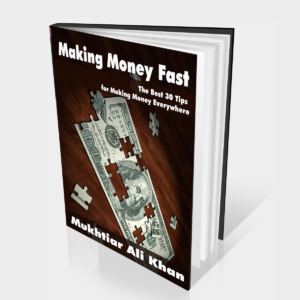Nobody buys something without knowing its price of it. The very thought of it is completely absurd. If you want to really get started in e-commerce with an online shop, then you logically have the following thought: What does an eCommerce website cost?
There is no general answer to this. You can create a small but very limited online shop for free. However, the scale is open at the top. The higher the demand, the more expensive it becomes. Shops like Amazon cost millions.
In this article, we systematically go through the most important factors that have a significant impact on the eCommerce website costs that await you. In this way, you can roughly estimate how much you will have to invest in your new project.
Would you like to set up your own online shop yourself? Then take a look at my Create Online Shop: Step-by-Step Instructions.
How much does an eCommerce website cost?
When contemplating the launch of an eCommerce website, one of the critical decisions revolves around cost. Understanding how much an eCommerce website costs involves considering various factors, including the choice between shared hosting vs WordPress hosting. This choice can significantly impact your budget and the overall success of your online store.

1. The cost of the shop system
Most online shops are not developed individually. That would take far too long, become very expensive, and take a long time. It is much easier and cheaper if you rely on a proven shop system.
Even as a layperson, you can put together your own online shop with just a few clicks of the mouse. Of course, your shop is far from finished by then. For example, you have to set up other pages for your shop and also list your articles.

If you want to adapt the ready-made shop pages to your ideas, then you have to allow for a little time. However, the shop systems are so user-friendly that you can easily do it after a familiarization phase.
If you have already dealt a little more closely with the topic of online shops, then you are probably already familiar with Shopify, Gambio, or Jimdo. These are cloud-based shop systems that are subject to a fee.
Open-source shop systems such as WooComerce or Prestashop are initially free of charge. In reality, however, you have to pay for certain things. We will take a closer look at this topic in the following section.
For the shop system alone you can expect costs of around 20-300 USD per month.
2. Domain and hosting costs
If you opt for a cloud shop system such as Shopify or Jimdo, then the costs for the domain and hosting are already included in the monthly price for the shop system.
Free open-source systems such as WooCommerce incur indirect costs for domains and hosting. You need a website that runs WordPress. For what reason? Very simple: WooCommerce is a plug-in for WordPress.
Are you now thinking: “Halt, stop!” Because you have no idea how to install WordPress on a website and get it to work? You don’t have to. As a rule, you can do this with a WordPress web hosting provider simply by pressing a button.
If you need a domain, you can order it from a provider like a web go, for example. But always make sure that you only use one domain with .de or .com ending. Otherwise, it could seem dubious, which you should avoid.
So what do you need to invest roughly in a domain and hosting per month? Here, too, the price range diverges widely. You can calculate costs of 10-100 USD per month.
Read also: What is Web Hosting to Choose? Best Offers to Consider
3. Product cost
When making your calculations, it is very important that you also keep an eye on the costs of ordering goods. There are basically three different options that you have:
- Dropshipping: With dropshipping, you sell products that you don’t have in stock yourself. You don’t need a large and expensive warehouse that you have to maintain. The product itself does not cost you anything.
- Private label: You can have a private label product made by a manufacturer, which you can personalize and sell under your brand name. In general, you can expect medium to high costs (3,000-10,000 USD per order).
- Develop your own product: Of course, you can also develop your own product. But this is very time-consuming, tedious, and also expensive. You have to reckon with very high costs, which can be well over 10,000 USD.
Before embarking on your adventure, it is imperative that you know exactly what you are doing. There are many legal pitfalls that you should be aware of. Especially when you import products from non-European countries, you have to be really careful.
It is best to get advice from a lawyer and other professionals beforehand. You have to comply with regulations and need certifications for certain product categories. You have duties of care and risks that you need to check beforehand. More on the topic in the section IT legal advice & insurance.
4. Storage & transport costs
Storage and transport costs are also important factors in your price calculation.
- Airfreight transport only takes 2-3 days. But for that, you also have to dig deep into your pocket.
- Sea freight, on the other hand, costs you comparatively little. It takes 6-8 weeks for the goods to arrive here.
- You can of course also set up your own warehouse. You then have to pay rent, electricity, heating, insurance, etc. month after month. A decent amount of money can quickly come together here.
- With a fulfillment service, you outsource your entire logistics to a service provider. Among other things, he accepts orders, packs the goods, and sends them. Of course, you have to pay for this all-around service.
- In the past few years, Amazon FBA has become very popular. This is also a fulfillment service. Amazon takes over the logistics completely for you. Amazon Prime customers can have their products delivered free of charge.
If you use a fulfillment provider, you can expect the following costs per package for receiving and shipping.
- Receipt of goods: 1.30 – 2 USD per package
- Storage: 6 – 12 USD per month per pallet or 1.50 – 6 USD per space in the warehouse
- Picking & shipping (depending on size, weight, and delivery area and whether national or international)
- 0.80 USD per pick (picking of the goods)
- 0.30 – 1 USD per shipment
Read Also: 10 Powerful Shipping Software for E-commerce Businesses
5. Product descriptions and product photography
Of course, you can write descriptions for your articles yourself if you can write really good texts. To do this, you need to know how to properly address your target group. It is important to find the right tonality. Otherwise, you will scare off prospective buyers.
So you need a strong sense of language. It is also critical that you know how to convert prospective buyers into buyers. The magic word here is conversion. In other words, your descriptions need to convert successfully.
The point, however, is that many aren’t really good at writing. It’s much more likely that you will sell much better if you rely on professional product descriptions.
An experienced copywriter will charge you 25-50 USD for each product description – depending on the length. That may sound like a lot, but what’s the point of a product description that doesn’t convince readers and encourage them to buy?
Great product photos are just as important. You should only do this yourself if you are really familiar with photography. Getting a product to look really good in a photo is an art. You can expect around 50 USD per picture here.
Read also: Why should you have an online shop created?
6. Design templates & logo design costs
You can select a standard template in your shop system and have a logo generated for you with a generator. It doesn’t cost you anything at first, but you definitely have an “off-the-shelf” design. Nobody is impressed.
Avarice is not always cool, to put it that way.
You may have heard of Fiverr and Co. before. There you can outsource such jobs for comparatively little money. Another option is to use a logo design platform like 99Designs.
This gives you the opportunity to create a logo design competition. The advantage here is that you get a lot of logo suggestions. However, the price is many times higher than that of Fiverr.
With a logo design, you can expect 50-300 USD. This may seem expensive, but you can be confident that you will get great work from a professional designer. The designer is responsible for any copyright infringement.
In addition to the logo, the design template of your shop system is a way of giving your online shop an individual touch. Therefore, you should think about using a paid design template. This would cost 50-150 USD.
7. IT legal advice & insurance costs
The danger of warnings is a tiresome topic for every online shop and website operator. You, therefore, need good IT legal advice. There are just too many underemployed and bored lawyers who want to make a “quick USD”.
You can use the services of the Händlerbund and the IT law firm. For IT legal advice, you become a member of the Händlerbund. It costs 25 USD / month.
When selling physical goods, corporate and product liability are important and it is in your own best interest to protect yourself against potential liability risks.
Corporate liability covers all damage caused by you, your company, or your employees (property damage, financial loss, etc.). If you do not have this protection, then you have to be liable for it with all of your company assets.
For corporate liability, 100 to 280 USD is due each year. That’s a small price to pay to insure yourself against a wide variety of risks.
Not only manufacturers but also quasi-manufacturers, distributors, and so on must be liable for damage caused by their products. Here the costs can quickly increase immeasurably, which can quickly drive your company into bankruptcy.
Product liability is part of business liability insurance. However, not all cases of damage are covered, such as real financial losses. It is therefore advisable in some cases to take out additional product liability insurance.
For product liability, you pay between 15 and 25 USD per month, depending on the product in question.
8. Transaction fees for payment providers
It is simply part of offering your customers payment options such as PayPal, Stripe, or Shopify Payment. They are fast and convenient and your customers are sure that they will get their goods too. If you don’t, I’ll buy some elsewhere.
Unfortunately, the disadvantage is that you have to pay hefty transaction fees with every order. However, you also get a smooth payment process that offers your customers all conceivable payment methods.
A smooth payment process can make or break an online shop. A recent study by us came to the conclusion that over three-quarters of abandoned shopping carts can be counted on during the payment process.
There are no transaction fees for Shopify Payments. But there are certain restrictions here. Not everyone can claim the Shopify Payments benefits. For example, if you live in Austria, Sweden, or Belgium, you have to pay fees.
The fees due are very similar to PayPal and Stripe. Roughly speaking, you pay 2.9% of the amount of money plus 30 cents as a surcharge for each transaction. The calculation at PayPal is a little more complicated in detail.
Consumer Buying Habit
Brands and dealers adeptly exploit shifts in consumer buying habits to their advantage. They diligently observe and analyze changes in preferences and behaviors, allowing them to tailor their marketing strategies and product offerings accordingly.
Whether it’s adapting to the increasing dominance of online shopping or capitalizing on the rising trend of eco-consciousness, brands, and dealers embrace these changes as opportunities to enhance customer experiences and drive sales.
By closely monitoring evolving buying habits, they can identify emerging trends, innovate their products, and create targeted marketing campaigns that deeply resonate with consumers. This proactive approach empowers brands and dealers to not only meet market demands but also gain a competitive edge, fostering customer loyalty and fueling business growth in the process.
Conclusion of eCommerce Website Cost
As you can see, the question “What does an eCommerce website cost actually?” Cannot be answered in a general and simple manner. Nobody can tell you in advance exactly what you need to invest in your online shop in USD.
Even a rough estimate is difficult because it depends on your wishes and goals. You have to differentiate between one-time and ongoing costs, which are also fixed or variable. This makes the calculation even more difficult.
For the shop system, the domain, and the hosting, the range is between 360 and 4800 USD/year. The product costs add up to 0-10000 (or more) USD. Corporate liability costs 100-280 USD annually.
You pay 100-450 USD once for an online shop template and logo.
The storage and transport costs are completely variable, as are the costs for product descriptions, product photos, product liability insurance, and payment processing with PayPal & Co.
As you can see, a lot is coming your way. Good preparation is everything. Don’t put your head in the sand! With a little effort, you can overcome all hurdles and obstacles. If you want to start right away, I recommend my article Create an Online Store.






